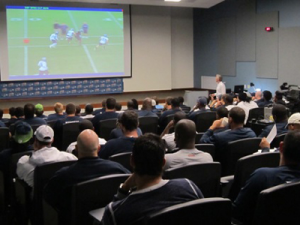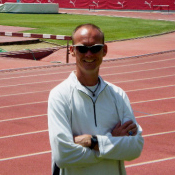Train Like a Pro
Having grown up in St Louis, I've been a diehard fan of our local teams for decades. I've lived the highs and lows; celebrating the championships and becoming crestfallen after the failures.
 No matter how good or bad the season, however, each team's coaches and athletes will always discuss how to upgrade. They'll ask what they need to do to improve the next season. The offseason will be their time for optimism, evaluation, and work.
No matter how good or bad the season, however, each team's coaches and athletes will always discuss how to upgrade. They'll ask what they need to do to improve the next season. The offseason will be their time for optimism, evaluation, and work.
What does this have to do with us runners? Well, even if you don’t think you are a competitive athlete, you are. All of us are competing against something. Our goal may be to beat poor health...or boredom...or the clock...or another person. Whatever it is, we are all out there for a reason, and we have seasons that find us training towards our next goal. What we can learn from professional athletes is how to fairly conduct an end-of-season evaluation and use it to better prepare ourselves to achieve our goal next season.
One of the toughest things to do after a season is objectively evaluate what we did right and what we can improve. We tend to go to extremes. Too often, our performances become caricatures of themselves. Great performances become almost too revered and perfect. Conversely, poor performances leave us wanting to scrap previous philosophies and start from scratch. Usually, the truth lies somewhere in between these extremes. Give yourself a couple of days after your race (or racing season) to let your emotions die down before you try to figure out what worked and what didn’t. Emotional, knee-jerk reactions almost never lead to improvement. When you sit down to evaluate your performance, try to look at all facets without positive or negative bias. When you find an area that you are interested in improving, prioritize it. Trying to change too much—or simply throwing everything against a wall to see what sticks—is never the best route to success.
As we discussed a couple of weeks ago in What's the Next Step, once we have completed our race and decided what to work on next, we need to set up a game plan that utilizes periodization. Use the preparation phase to gauge your current fitness baseline. It’s impossible to plan a route if you don’t know your starting point. Tools like a VO2 Max test or a Functional Movement Screening can give you insight into what you are doing well and what needs to be improved. These tests provide invaluable, objective analyses of your cardiovascular and muscular baseline.
Once you have your plan and an objective starting point, map out your preparation strategy for next season. Professional athletes excel in this area because they are open to help from experts. If professional athletes—people who can read their bodies like a book—can accept help from others, we can, too. We shouldn’t try to fix things on our own simply because we read some article (yeah, like this one). Now is the time to find a coach or personal trainer who can help get you to where you want to go. Think of yourself, the athlete, like a car. Your coach is your GPS. You tell your GPS/coach where you want to go, and he or she will give you the most effective route to get there. Sure, you might find your way to your goal on your own, but a coach or trainer will get you there quicker.
As you reach the end of the season, take a page from the pros. By following their example of how to become a better athlete in the offseason, you will have a more successful next season. It's time to train intelligently like the competitive athlete you are!
 Tim Cary is Fleet Feet's Assistant Training Manager and coach of the Fleet Feet-sponsored Runnababez Elite team. Over his more than two decades of coaching, Tim has coached athletes to three national team championships, five national individual championships, two national records, and numerous All-American and All-State honors. Click here to receive Tim's weekly article via email.
Tim Cary is Fleet Feet's Assistant Training Manager and coach of the Fleet Feet-sponsored Runnababez Elite team. Over his more than two decades of coaching, Tim has coached athletes to three national team championships, five national individual championships, two national records, and numerous All-American and All-State honors. Click here to receive Tim's weekly article via email.
Connect With Us
see the latest from Fleet Feet St. Louis